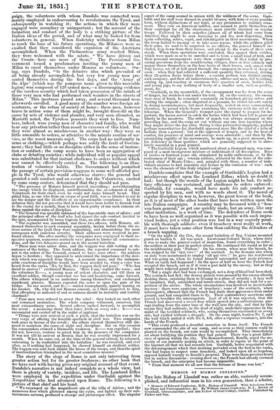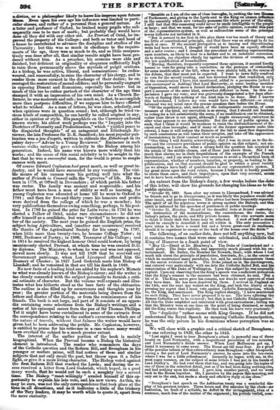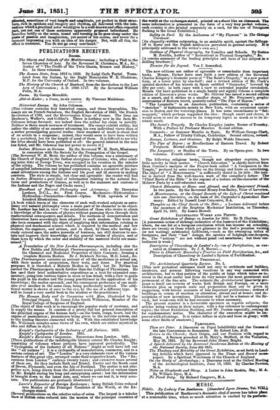MEMOIR O' BISHOP COPLESTON. * THE late Bishop of Llandaff was
rather an able, variously accom- plished, and influential man in his own generation, than a scholar, • Memoir of Edward Copleston, D.D., Bishop of Llandaff. With Selections from his Diary and Correspondence, &c. By William James Copleston, M.A., Hector of Cromhall, Gloucestershire, and late Fellow of Oriel College, Oxford. Published by Parker and Bon. ardor classes, and rather- of tr personal than a general nature. As ' finished, but deficient in ' or eloquenoe sufficiently high 1 the low qualification of householders.
former; he was moderate and safe; too much so, in fiat, to acconiplish ; wards at finding that-flaking of the kind wag' to be done. - Had -1 kn° more than postpone difficulties if we suppose him. teliave e50., ea ' balanced was my mind, upon the precise question then before the House. - what-he wished. As a man of letters„ he was close, scholarlant
y
Doctrines or Necessity and Predestination," which-" yieldid. peace to de- various walks naturally gave celebrity to the Bishop among his , dgletan generation. Indeed, his name was. known- more widely than his works ; and the cause of this social celebrity is to be sought in the fact that he was ~manful man, for the-world-is prone to eon.ple success with merit.
Of course Edward Coplestonfrartg,reat merit, as well as greatin- dustry, and he would have succeeded its any vocation. The visi- ble means of his success were his getting well into what the anther of Friends in Council calla the "grooves" of rife. He was. born in. 1778, at Offwell in Devonshire ; of which parish hia father Was rector. The family was ancient and respectable ; anclhis father must have been. a man of ability as well as learning,, for you-ng Copleston was educated at home till he went to Oxford in 791; and- then for five-and-thirty years his &impure and profits were derived from the college of which he was a member his Very publications themselves owing something, perlir.ips, to his:posi- tion. In I'M he gained the prize for Latin verse; in. /795 he was elected a Fellow of Oriel, under rare circumstances': he did not offer himself as a candidate, but was " invited' to become a mem- ber of the society. The next year he gained. the F.nglish. prize, the tiabject being Agriculture, and (another rare- occurrence) received the thanks of the Agricultural Society for his- essay: In 1797, when little more than twenty-two, he became College Tutor; in /1102, Pinfessor of Poetry;. in 1806, Treasurer of his College; and_ in 1814 he received' the highest honour Oriel could. bestow,, by being. unanimously elected Provost, at which time he was waisted.
by diploma. The Ministry, M whom he- was and wag not opposed, moved more slowly. It was not till 1826 that he received any (government patronage, when Lora Liverpool offered him the Deanery of Cheater; in. 1827 Lord. Goderic.b. made him Bishop- of Llandaff ; and he remained in that see till his death. in 1.849..
No new facts of a leading kind are added by his nephew's Memoir to. what was already known of the Bishop's career ; and the writer is too closely connected with the subject personally to furnish a criti- oal estimate of character. But the volume well expands and illus- trates what has hitherto stood. as the bare fads of the obituaries. The outline is also filled up by occurrences and thoughts year by
-; the greater portion of the materials being drawn from the- letters and diaries of the Bishop, or from the reminiscences of his friends. The book is not large, and part of it consists of an appen- dix containing some selections from the Bishop's- writings and a notice of his episcopal career from the pen of Sir Thomas Phillips, Yet it might have borne curtailment in some of the extracts from- the
correspondence relating to the author's exeui along which are of
the nature of travels without that fulness the writer would have, Oven had he been addressing the putilie. Kr. Copleaton, however, ne entitled to praise for his reticence in- a. cue where many. would have overlaid the subject tea much greater extent. The interest of the earlier portion of the hook is mainI biographical. When the Provost beeeme a Bishop the histori element is introduced- The reader who remembers- the days of the Catholic question and the Reform Bill, and Brougham in his younger or mature prime, will find notices of these and similar subjects that not only recall the past, but throw upon it a fuller light, or give it a more living character. The Bishop voted against the first Reform Bill that reached the Lords; and during the re- cess received a letter from Lord Goderich, which hoped, in a good many words, that he -would net ba sack a naughty- boy a second time. The Bishop. "most willingly" availed himself of this op- portunity to explain his late vote, and, his new views. As this, we may be sure, was not the only correspondence that took place at the time in all directions,, and as it indicates a little of the trickery of the Tory leaders, it may be worth while to quote it, apart from the mere curiosity. a. diviue, or a philosopher likely to leaver his impress upon Mare I "Simaible as. I, am of the- US of close boroughs,, in uniting; the two Houses
tithes. Even upon his own age his influence- Parliament, and giving to the Lords and to the King an unseen. intleenee was limited to parti- in the assembly which now virtually possesses the whole power of the-state,
1 ateti feelanthatthtahist reasoning,-crouladanalver be made intelligible to the people aesa.tuuetourtiany dropserotafesbthermeirof 0 yothmar,khe; btrainedi;.tprobamanyyttepilswowulrodhavsube- I. of- it,hrlere. tasentad tiwe must, fo thee ofpublic.opinion, remodel tins. pare ve system,.as well as enfranchise soma of the prinmpal. done all they did with- any other aid. As Prevost otiOriel, he ire- ,I towns hitherto not included in it. proved the property of the- College ; and both ZS' tutor and head of i "But it seemed tame that in this plan there was too much of theory and.
too little of constitutional principle, and that there was an attempt to do too
a house he contributed to advance the discipline and studies of the ' If .ythe ancient prerogative as to issuing and discontinuing 17niversity ; but this was so much in obedience to the require- I manletsta had been rev;i :WI thought itthewpouldad" hevealfiefen an i equally efficient tively was done after all, that similnr results might have been- pro- ! upon numbers, as likely to lead to a farther and to an inanite7extentasio. in meats or the age, there was so much to do, and so little oompara- ' duped without him. As a .pmacher; his sermons, were able and Ag to detail*, ray objection chiefly lay against the division of counties, and
_ " Raving therefore, frequently expressed these opinions, it seemed hardly-
Ira raise them permanently a ve myriads of pulpit orations- I houest to rotator going-into a committee, on the pretence of contending Is a-bishop, he was active,. liberal, and conscientious.: he endea- ' ear some modification of the bill, when we were plainly tofd„in_the-co of voured, and successfully, to raise the character of his clergy, and to ' the debate that that must not be expected. I went to town fully resolved reader them more earnest in the discharge of their duties; he en_ I to vote for the second reading, and was diverted from that resolution only. , by the consideration I have just mentioned; added to a persuasion (which. I sem.agea the restoration ofsacred edifices; and he personallyengaged :fry/vet-a/Tara' jek/4de") that Lord Harrowhy, or some leading member ifr posing Dissent and Romanism, especially the latter: but in i pm:aeons:1ton, wouldoemove a .formal declaration, pledging the-Home to- sup- of this- too he rather partook of the character- of the age than i f the same kind, somewhat different in form. In, thi. s ax- stamped it with all impression of his awn mind. As a Chinch Re. 1 peetation I gave my- vote-; and was grievously disappointed &few daya -.
this beforehand, I believe my vote would have been, different—so nicely i "'Of the expediency, and, indeed, of the indispensable necessity, of some when opinions were in question, sound;. but, although he tried vite measure of the-kind, myconvietion is.so strong, that I: should not hesitate lions kinds of composition,. he can hardly be called original in any,, ilk votingfor a bill, substantially the same„ if no- modification. can be obtained, either in opinion. or style. His pamphlets on the Currenoy enforced: rather than throw it out again,.although.I . stannuously eudeavour to known. views; his ablest work perhaps was the "Inquiry into the- such that , a !.t.F.'1)_ e state of public opinion is mwtuat 1 tenth "t would 'the madness . to resist the disfranchisement of cayed and close boroughs; and if manyof the former° opponents mmaen he this the disquieted. thoughts" of an antagonist and. Edinburgh. Ile- 1 avowal, I hope it .willinduce the framers of the bill to meet that disposition viewer, the late Professor Ear D.X. Sandford. ;. his . most popular pu.b. 1 by such concessions as will lessen their scruples, and take off the-appearance lication was ajeir &esprit, written to ridicule the Edinburgh in its a inconsistency in their conduct as much as possible. . palmy days--"-Advice- to. a Young' Reviewer." Eminence in such. ' Oned. the gxItewill franklackna acknowledge, ledatei3O that I was ittiearrol-.3.as. to the dee and' as I-nnalve NZ. whenateaosttng- hording: aumestionliumjaaact;quireduiln the minds of the middle classes,. and of those justa'bovethem. But I see much that alarms rae iii their forgetfulness. of the example of the Enough. Revolution ; aniiI am more than ever anxious to aroid.a theoretical basis-of representation,, whether of numbers, taxation or property, as leading to Re- p m, and on that account should be taxation, to retain a meat variety (as we alerays have had)- of qualifications in our representative system. I lay peat stress upon the.wordl retain, because I behevo it is hardly possible to create them anew, and their importance, upon. that very account, seems not to have been_ sufficiently estimated."
An extract. from the Bishop's diary, e few weekshefore the,date of this letter, will show his grounds for changing his-Haase& to the public opinion.
"October 22, last Soon after my return to Llansenfraed, Iwo; advised by friends not to go to- Aberg,avenny, as it was likely the pomilarie would offer some insult, and perhaps violence. This advice has been frequently repeated. The spirit of all the populous towns is strong against the Bishops, and this spirit is inflamed by the speeches of gentlemen at public meetings. " October 31, Monday. Heard of the dreadful riots- at Bristol yesterday; the destruction of the mansionhouse, the customhouse, the excise, the bishop's palace, the gaols, and fifty private houses. My own servants seem to think it likely that this house may be attacked. It mob of half-a-dozen would be enough to demolish it and an within it. The only precaution I have taken is to- have a round hat and a brown great-coat in readiness, should. it be expedient to escape at the back of the house over the fields."
The following, of an earlier date, does not tell anything new„ but it contains two names that were once celebroted,. and exhibits- the King of Hanover in a frank point of view.
"May 13.,--Dined at Dr. Blomberg's. The Duke of Cumberland- and a small party. The Duke affable, and apparently much plieeied with his en- tertairunent. Mr. Sadler, the Member for Newark, there, with whom I had much talk about the principle of population, free trade, 8cc..• in the course of whieh he maintained many paradoxes, but said he eould.dlnonstrate them by the surest evidence of facts.. The Duke joined us in. the drawingroom and, entered very particularly with me into the Catholic Relief Bill, and hi; renunciation of the Duke of Wellington. Upon this subjeethe was unusually explicit. Upon my observing that the King's speech was a sufficient indication. that the Ring's consent to the measure had been obtained, he said, 'Not a hit of it. ThaKing never gave his consent, nor does-he now approve of what they have done. He has- been deceived by them. I ariived in England on the 14th, and the next day waited on. the King,. and took the liberty of ex- preseing my regret that I must vote against Catholic Emancipation, which. he, the lung, had sanctioned. The. King replied sharply, have sanctioned no such thing. They have never proposed it to me. The laws ejecting the Roman Catholics are to be rcc'iew'edt but that is not Catholic Emancipation.' All this the Duke amplified and reiterated with greatemmestnesii; telling me that the Ministry were at one time on the poiot of being dismissed, so much. did the-King resent this.cluplicity. He then took his leave very graciously."
The " duplicity " rather seems with King- George. If he did not understand the' Royal Speech as meaning Catholic Emancipation,. he was. the only -person in his dominions whose perception was so dull.
We will close with a. graphic and- a. critical sketch of Brougham.; the one referring to 1839, the other to 1843.
"Last night I went to hear Brougham's attack (a powerful one of three hours) on- Lord- Normariby, with a magnificent peroration of ten
and Lord Normanby's feeble- answer. When Lord Melbourne got up, I found it necessary to come away. The House sat till near four. As a proof of the peculiar talents of that extraordinary man Brougham—after his speech, daring a flat part of Lord Normanby's answer, he came into the tea-room where I was for a- little refreshment. Instantly. he began_ with me, in the
most eager manner, on the subject of some letters I had put in his, hands of Loul Dudley's. He had read them that day,. and waa going into the topics of one of them in the minutest detail„juat as if he had been doing nothing else, and. had nothing upon his mind. I gave him another parcel, and we went beck to the House together. lie, I perceive- by the papers this morning, not only sat to the end, but made, a sharp and. effective reply. at. the close."
• • " Brougham's last speech on the Ashburton treaty was a wonderful dis- play of his greatest talents. Three hours and five minutes by the clock—no hesitation, no fault of a syllable, no defect in the arrangement, even of a sentence, much lees of the matter of time argement ; his periods varied, cum- pficated, sometimes of vast length and amplitude, yet perfect in their struc- ture, rich in epithets and imagery and rhythm, all delivered with the into- nations which a practised actor would give to a well-known and often-repeated part, yet not one of these sentences apparently prepared beforehand. He launches boldly on the ocean, tossed and turning as he goes along under the gusts of passion and imagination, yet secure of his course, and never for a moment impressing you with an idea of his danger. But, with all this, the effect is transient. You do not go away convinced."




























 Previous page
Previous page